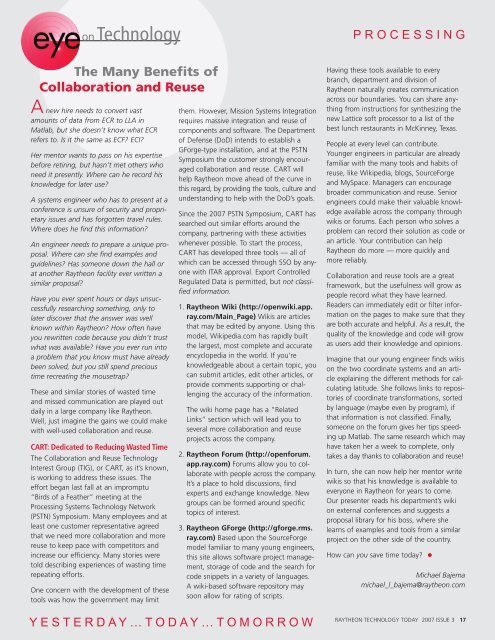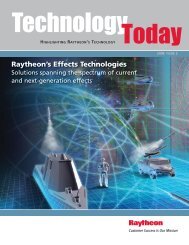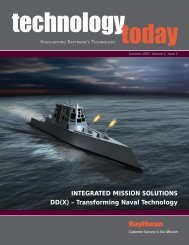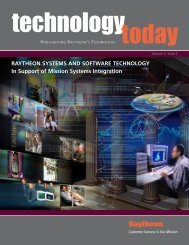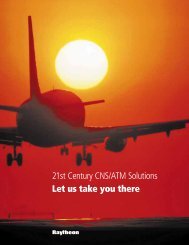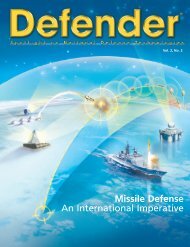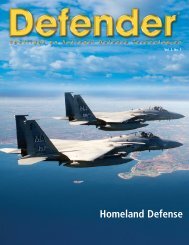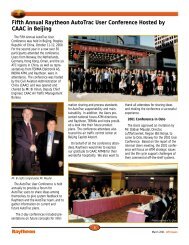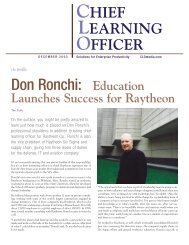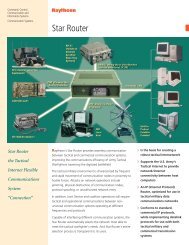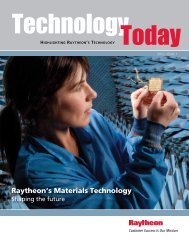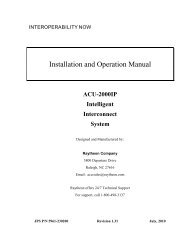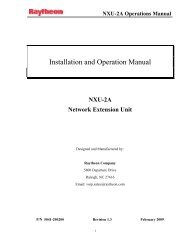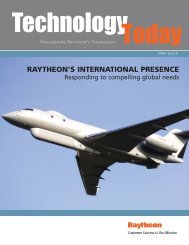2007 Issue 3 - Raytheon
2007 Issue 3 - Raytheon
2007 Issue 3 - Raytheon
You also want an ePaper? Increase the reach of your titles
YUMPU automatically turns print PDFs into web optimized ePapers that Google loves.
onTechnology<br />
The Many Benefits of<br />
Collaboration and Reuse<br />
A new hire needs to convert vast<br />
amounts of data from ECR to LLA in<br />
Matlab, but she doesn’t know what ECR<br />
refers to. Is it the same as ECF? ECI?<br />
Her mentor wants to pass on his expertise<br />
before retiring, but hasn’t met others who<br />
need it presently. Where can he record his<br />
knowledge for later use?<br />
A systems engineer who has to present at a<br />
conference is unsure of security and proprietary<br />
issues and has forgotten travel rules.<br />
Where does he find this information?<br />
An engineer needs to prepare a unique proposal.<br />
Where can she find examples and<br />
guidelines? Has someone down the hall or<br />
at another <strong>Raytheon</strong> facility ever written a<br />
similar proposal?<br />
Have you ever spent hours or days unsuccessfully<br />
researching something, only to<br />
later discover that the answer was well<br />
known within <strong>Raytheon</strong>? How often have<br />
you rewritten code because you didn’t trust<br />
what was available? Have you ever run into<br />
a problem that you know must have already<br />
been solved, but you still spend precious<br />
time recreating the mousetrap?<br />
These and similar stories of wasted time<br />
and missed communication are played out<br />
daily in a large company like <strong>Raytheon</strong>.<br />
Well, just imagine the gains we could make<br />
with well-used collaboration and reuse.<br />
CART: Dedicated to Reducing Wasted Time<br />
The Collaboration and Reuse Technology<br />
Interest Group (TIG), or CART, as it’s known,<br />
is working to address these issues. The<br />
effort began last fall at an impromptu<br />
“Birds of a Feather” meeting at the<br />
Processing Systems Technology Network<br />
(PSTN) Symposium. Many employees and at<br />
least one customer representative agreed<br />
that we need more collaboration and more<br />
reuse to keep pace with competitors and<br />
increase our efficiency. Many stories were<br />
told describing experiences of wasting time<br />
repeating efforts.<br />
One concern with the development of these<br />
tools was how the government may limit<br />
them. However, Mission Systems Integration<br />
requires massive integration and reuse of<br />
components and software. The Department<br />
of Defense (DoD) intends to establish a<br />
GForge-type installation, and at the PSTN<br />
Symposium the customer strongly encouraged<br />
collaboration and reuse. CART will<br />
help <strong>Raytheon</strong> move ahead of the curve in<br />
this regard, by providing the tools, culture and<br />
understanding to help with the DoD’s goals.<br />
Since the <strong>2007</strong> PSTN Symposium, CART has<br />
searched out similar efforts around the<br />
company, partnering with these activities<br />
whenever possible. To start the process,<br />
CART has developed three tools — all of<br />
which can be accessed through SSO by anyone<br />
with ITAR approval. Export Controlled<br />
Regulated Data is permitted, but not classified<br />
information.<br />
1. <strong>Raytheon</strong> Wiki (http://openwiki.app.<br />
ray.com/Main_Page) Wikis are articles<br />
that may be edited by anyone. Using this<br />
model, Wikipedia.com has rapidly built<br />
the largest, most complete and accurate<br />
encyclopedia in the world. If you’re<br />
knowledgeable about a certain topic, you<br />
can submit articles, edit other articles, or<br />
provide comments supporting or challenging<br />
the accuracy of the information.<br />
The wiki home page has a “Related<br />
Links” section which will lead you to<br />
several more collaboration and reuse<br />
projects across the company.<br />
2. <strong>Raytheon</strong> Forum (http://openforum.<br />
app.ray.com) Forums allow you to collaborate<br />
with people across the company.<br />
It’s a place to hold discussions, find<br />
experts and exchange knowledge. New<br />
groups can be formed around specific<br />
topics of interest.<br />
3. <strong>Raytheon</strong> GForge (http://gforge.rms.<br />
ray.com) Based upon the SourceForge<br />
model familiar to many young engineers,<br />
this site allows software project management,<br />
storage of code and the search for<br />
code snippets in a variety of languages.<br />
A wiki-based software repository may<br />
soon allow for rating of scripts.<br />
YESTERDAY…TODAY…TOMORROW<br />
PROCESSING<br />
Having these tools available to every<br />
branch, department and division of<br />
<strong>Raytheon</strong> naturally creates communication<br />
across our boundaries. You can share anything<br />
from instructions for synthesizing the<br />
new Lattice soft processor to a list of the<br />
best lunch restaurants in McKinney, Texas.<br />
People at every level can contribute.<br />
Younger engineers in particular are already<br />
familiar with the many tools and habits of<br />
reuse, like Wikipedia, blogs, SourceForge<br />
and MySpace. Managers can encourage<br />
broader communication and reuse. Senior<br />
engineers could make their valuable knowledge<br />
available across the company through<br />
wikis or forums. Each person who solves a<br />
problem can record their solution as code or<br />
an article. Your contribution can help<br />
<strong>Raytheon</strong> do more — more quickly and<br />
more reliably.<br />
Collaboration and reuse tools are a great<br />
framework, but the usefulness will grow as<br />
people record what they have learned.<br />
Readers can immediately edit or filter information<br />
on the pages to make sure that they<br />
are both accurate and helpful. As a result, the<br />
quality of the knowledge and code will grow<br />
as users add their knowledge and opinions.<br />
Imagine that our young engineer finds wikis<br />
on the two coordinate systems and an article<br />
explaining the different methods for calculating<br />
latitude. She follows links to repositories<br />
of coordinate transformations, sorted<br />
by language (maybe even by program), if<br />
that information is not classified. Finally,<br />
someone on the forum gives her tips speeding<br />
up Matlab. The same research which may<br />
have taken her a week to complete, only<br />
takes a day thanks to collaboration and reuse!<br />
In turn, she can now help her mentor write<br />
wikis so that his knowledge is available to<br />
everyone in <strong>Raytheon</strong> for years to come.<br />
Our presenter reads his department’s wiki<br />
on external conferences and suggests a<br />
proposal library for his boss, where she<br />
learns of examples and tools from a similar<br />
project on the other side of the country.<br />
How can you save time today?<br />
Michael Bajema<br />
michael_l_bajema@raytheon.com<br />
RAYTHEON TECHNOLOGY TODAY <strong>2007</strong> ISSUE 3 17


